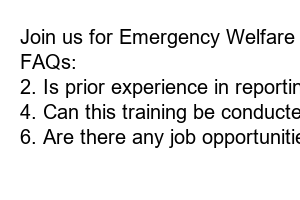긴급복지 신고의무자 교육
Title: Emergency Welfare Reporter Training: Equipping You to Support Communities in Crisis
Introduction:
Being a source of vital information during emergencies is a responsibility that falls upon welfare reporters. Their role involves serving communities by reporting on emergency situations, providing crucial updates, and ensuring the well-being of individuals in crisis. Are you interested in becoming a welfare reporter and having a positive impact during emergencies? Join us for Emergency Welfare Reporter Training to gain the necessary skills and knowledge to make a difference when it matters the most.
1. The Importance of Welfare Reporters:
Welfare reporters play a crucial role in disseminating information and supporting affected communities in times of crisis. They act as a bridge between emergency responders, organizations, and the public, ensuring accurate and timely information reaches those in need.
2. Comprehensive Training Program:
Our Emergency Welfare Reporter Training program is designed to empower individuals with the essential skills to handle emergency situations effectively. Participants will learn about disaster preparedness, incident reporting, crisis communication, and community engagement strategies.
3. Hands-On Simulations:
During the training, participants will engage in practical simulations to enhance their crisis reporting and communication abilities. These exercises will allow them to navigate challenging scenarios, make informed decisions, and gather accurate information to empower the affected community.
4. Effective Communication Techniques:
Effective and clear communication during emergencies is paramount. Our training focuses on equipping participants with communication techniques suitable for crisis situations. Participants will learn to convey important updates concisely, maintain empathy, and manage high-stress environments.
5. Leveraging Technology:
In the digital age, technology plays a vital role in emergency reporting. Our training program emphasizes the use of various digital tools, platforms, and social media to disseminate accurate information swiftly. Participants will learn how to maximize the potential of technology to reach a broader audience and mobilize support.
6. Ethical Considerations:
Ethical reporting is of utmost importance, especially during emergencies. Our training program delves into the ethical considerations that welfare reporters need to be aware of while reporting on crisis situations. Participants will gain insights into respecting privacy, sensitivity, and cultural diversity when sharing information during difficult times.
7. Building Resilience:
Welfare reporters often face challenging and emotionally demanding situations while reporting during emergencies. Our training focuses on building resilience and providing participants with the tools to cope with stress, trauma, and compassion fatigue, ensuring their own well-being while effectively supporting communities.
Summary:
Join us for Emergency Welfare Reporter Training to equip yourself with the necessary skills to make a difference during emergencies. Our comprehensive program covers disaster preparedness, crisis reporting, effective communication techniques, technology utilization, ethical considerations, and building resilience. Become a valuable asset in times of crisis by enrolling in our training program and contributing to the welfare of affected communities.
FAQs:
1. Who can participate in Emergency Welfare Reporter Training?
2. Is prior experience in reporting or crisis management required?
3. Will participants receive a certificate upon completion of the training?
4. Can this training be conducted online?
5. How long does the training program last?
6. Are there any job opportunities after completing the training?

